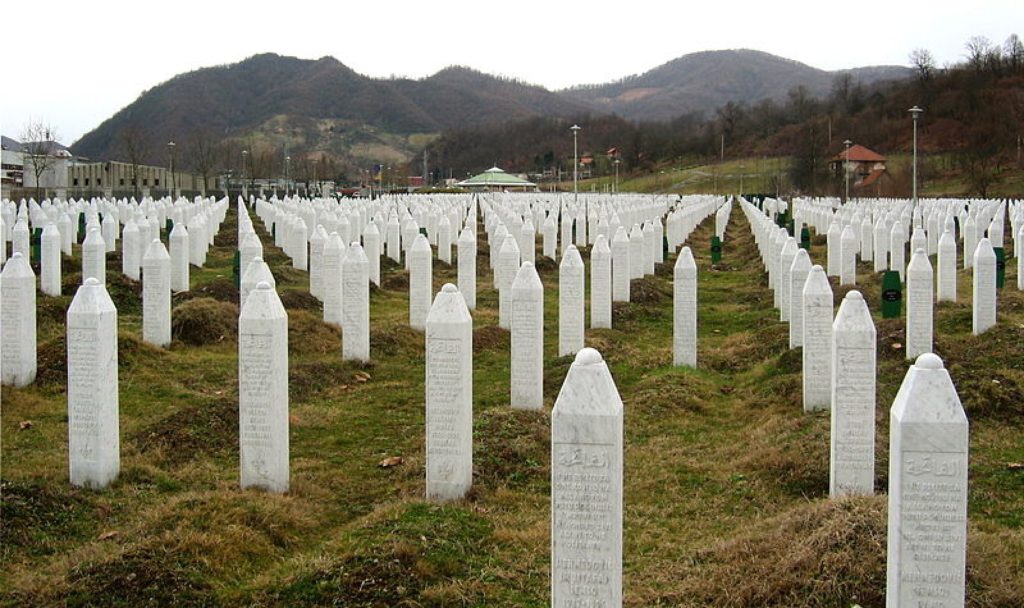The European Foreign Affairs council on Monday discussed the recent constitutional crisis in Bosnia and Herzegovina and did not exclude the possibility of sanctions against secessionist forces in the country.
A number of member states reportedly supported sanctions against Republika Srpska, the Serb-dominated entity and its divisive leader Milorad Dodik for his secessionist rhetoric and actions which risks undermining the fragile unity and territorial integrity of the country. Among others he considers establishing a separate army or militia and opposes a law which would criminalise denial of genocide.
He was referring to what happened in July 1995 in Srebrenica, where more than 8,300 Muslim men and boys were killed in a massacre that international courts would later define as genocide, the first one on European soil since the Holocaust in WWII.
The Muslim men were separated from the rest of the population and murdered by Bosnian-Serb forces under the command of general Mladic, while Dutch UN soldiers, outnumbered and without the support of UN air strikes, were unable to prevent the massacre.
At the 25th commemoration of the massacre last year, European Council President Michel, European Commission President von der Leyen, and High Representative/Vice-President Borrell described the Srebrenica genocide as one of the darkest chapters of modern European history.
The prevailing mood in the countries involved in the war in Bosnia-Herzegovina in the 90-ies is still dominated by nationalistic narratives that prevent them from coming to terms with the past and engaging in a true reconciliation process, a condition for them joining the EU.
The latest development in Bosnia and Herzegovina, which has been described by the current international High Representative to the country, Christian Schmidt, as “its greatest existential threat of the post-war period”, comes hardly as a surprise to the European Commission.
In its latest country report on Bosnia and Herzegovina, published in the enlargement package on 19 October, the Commission wrote that the public political commitment of the authorities at all levels of government to the strategic goal of European integration has not been turned into concrete action, as political leaders continued to engage in divisive rhetoric and unconstructive political disputes.
“The political environment remained polarised in the reporting period, with repeated calls from the Republika Srpska entity leadership to roll back reforms and to block State-level institutions."
The political disputes have hindered overall progress on 14 key priorities from the Commission’s opinion in May 2019 that are conditions for the country to advance from the status of potential candidate country to a candidate country. To this to happen, Bosnia and Herzegovina must become a country of all its citizens.
Among others, the country must ensure that elections are conducted in line with European standards and ensure equality and non-discrimination of citizens by addressing the ruling of the European Court of Human Rights in the Sejdić-Finci case dating back to 2009. General elections are scheduled to take place in October 2022. Still the electoral system prevents citizens not being Bosniaks, Croats or Serbs from standing for election.
The EU is committed to the unity and territorial integrity of Bosnia and Herzegovina. Will the European External Action Service (EEAS) explore the possibility of adopting sanctions against Republika Srpska at next foreign affairs council?”
“EU has a sanctions framework since 2011,” replied Peter Stano, Lead Spokesperson for Foreign Affairs and Security Policy, at a press conference yesterday in Brussels (16 November). “In light of the recent development in the country, the unacceptable rhetoric and some actions undermining the unity of state institutions, foreign affairs ministers discussed the situation. All options are currently on the table.”
Republika Srpska is one of the two entities which were recognised in the Dayton Agreement in 1995 which ended the civil war in Bosnia and Herzegovina. The other entity is the Federation of Bosnia and Herzegovina which consists of 10 autonomous cantons with their own governments and legislatures. “The Federation entity government is still acting in a caretaker role,” according to the Commission.
“The way EU is acting in Bosnia and Herzegovina does not instil trust in the Union,” commented MEP Tineke Strik (Greens/EFA) at a briefing yesterday after returning from a fact-finding mission to the country, where she met key stakeholders.
Already on 12 October, she and other MEPs from the main political party groups sent a letter to Borrell and Schmidt warning against the escalations of tensions in Bosnia and Hercegovina (BiH). They specifically related to the recent concrete steps towards “the secession of Republika Srpska (RS), undertaken by the nationalist political leadership of the RS entity”.
In their letter, the MEPs wrote that “clear and firm consequences must follow” if the assembly of RS would vote for unilateral measures that would violate the legal structure of the country.
In Bosnia and Herzegovina, there is a need to reform both constitutional and electoral law, according to MEP Strik, but she gives priority to the latter and the strengthening of the electoral committee in the country in view of the elections next year. “EU plays with time and should talk with one voice,” she stressed. “It must define its red lines and react if they are crossed.”
M. Apelblat
The Brussels Times

